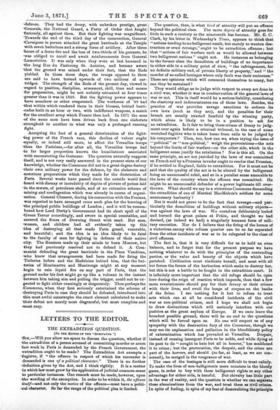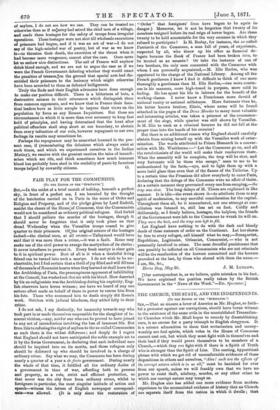LETTERS TO THE EDITOR.
THE EXTRADITION QUESTION.
[TO TER EDITOR OF THE "SPECTATOR, 1
you allow me space to discuss the question, whether if -the extradition of a person accused of committing murder or arson 'last week in Paris is demanded by the French Government, the extradition ought to be made? The Extradition Act exempts a 'fugitive, if "the offence in respect of which his surrender is demanded is one of a political character." There is no further -definition given by the Act, and I think rightly. It is a matter -in which law must grow by the application of judicial common-sense to particular instances. One remark must be made, however, upon -the wording of the exemption. In order to be within it, the offence itself—and not only the motive of the offence—must have a politi- ical character. So far the range of the political plea is limited. The question, then, is what kind of atrocity will put an offence beyond the political class. The mere degree of atrocity goes for little in such a century as the nineteenth has become. Mr. E. C. Clark, by his letter in Wednesday's Times, appears to think that "actions tending to no belligerent result, but merely to wanton des- truction or cruel revenge," ought to be extradition offences ; but that "actions of fair warfare such as would be allowed between two belligerent nations" ought not. He instances as belonging to the former class the demolition of buildings of no importance
to either side in a military point of view, "the infringement, for no definite military end, of private liberty or property," and "the murder of so-called hostages whose only fault was their eminence." These are opinions which will commend themselves to many, but can they be sustained?
They would oblige us to judge with respect to every act done in a civil war, whether it was in contravention of the general laws of war or not. This in itself would be a serious liability, considering the elasticity and indeterminaten ess of those laws. Besides, the practice of war provides savage sanctions to enforce its own laws (such as they are), and the penalties for their breach are usually exacted fourfold by the winning party, which alone is likely to be in a position to ask for an extradition. Is it fair to bring these crimes of frenzy to judg- ment over again before a criminal tribunal, in the case of some wretched fugitive who is taken home from exile to be judged by his conquerors ? Then, too, how can we, when trying the issue of " political " or "non-political," weigh the provocations—the acts beyond the limits of fair warfare—on the other side, which in the belligerent sense justify the retaliation ? Nor is this all. On the same principle, an act not justified by the laws of war committed
on French soil by a Prussian invader ought to render that Prussian, if he settled in England, liable to extradition. For it must not be
said that the quality of the act is to be altered by the belligerent being an unsuccessful rebel, and so in a peculiar sense amenable to the laws of the country where the offence was committed. He might be an unsuccessful defender of a power legitimate till over- thrown. What should we say to a victorious Commune demanding the extradition of one of Marshal MacMahon's soldiers for some unnecessary barbarity ?
But it would not prove to be the fact that revenge—and par- ticularly the demolition of buildings without military objects—
was against the laws of war. We ourselves deliberately looted and burned the great palace at Pekin, and thought we had devised, (as indeed we had) a singularly humane form of mili- tary execution. Nor do I believe that the firing of the homes of a victorious enemy who refuses quarter can be so far separated from the other incidents of war as to be relegated to the class of civil offences.
The fact is, that it is very difficult for us to hold an even balance, and to forget that for the present purpose we have nothing whatever to do with the principles of the contending parties, or the value and beauty of the objects which have perished. Civilization must vindicate herself, and meet with all her forces the forces of the barbarism which 'seeks to destroy her, but this is not a battle to be fought in the extradition court. It is infinitely more important that the old refuge should be open here during the reign of reaction which impends, than that a few more revolutionists should pay for their frenzy or their crimes with their lives, and swell the heaps of corpses on the banks of the Seine. I see nothing for it but to refuse to treat acts which can at all be considered incidents of the civil war as non-political crimes, and I hope we shall not begin to draw distinctions which will seriously interfere with our position as the great asylum of Europe. If we once leave the broadest possible ground, there will be no end to the questions which will be forced upon us. No one will suspect us of any sympathy with the destructive fury of the Commune, though we may see its explanation and palliation in the bloodthirsty policy of extermination which has prevailed at Versailles. Despair, instead of rousing insurgent Paris to be noble, and while dying at its post to do "nought in hate but all in honour," has maddened it to crime ; but the provocation, the despair, and the crime are part of the horrors, and should (so far, at least, as we are con- cerned), be merged in the vengeance of war.
The case of the hostages is still more difficult to treat calmly. To make the lives of non-belligerents mere counters in the bloody game, in order to buy with them belligerent rights or any other
advantage for either side, is hateful. But chivalry has little part in the war of reality, and the question is whether we can separate
these abominations from the war, and treat them as civil crimes. In spite of feeling, in spite of my fear of demoralizing the principle of asylum, I do not see how we can. They can be treated no otherwise than as if an,army had seized the chief men of a village, and made them hostages for the safety of troops from irregular operations. These hostages were not shot till wholesale executions of prisoners had begun, and if it was an act of war—I do not say of the high-minded war of poetry, but of war as we know it—to threaten their death, the execution of the threat when it had become mere vengeance, cannot alter the case. Once more let us eschew nice distinctions. The soil of France will anyhow drink blood enough, and we are not to argue the case as if we were the French Government debating whether they would exact the penalties of ticason4on the ground that special acts had dis- entitled their prisoners to the leniency which might otherwise have been accorded to them as defeated belligerents.
Truly the Reds and their English advocates have done enough to make our position difficult. There is a bitterness of hate, a destructive animus in their utterances which distinguish them from common opponents, and we know that in France their fana- tical leaders have as little scruple to impose their views on the population by force as any Roman Inquisitors. But these are circumstances in which it is more than ever necessary to keep fast hold of principles, and having determined that the hunt after political offenders shall stop short at our boundary, to abstain from every infraction of our rule, however repugnant to our own feelings its results may sometimes be.
Perhaps the repugnance may be somewhat lessened in the pre- sent case, if (remembering the delusions which always exist at such times, and which we experienced ourselves in the Indian Mutiny), we receive with the greatest caution the tales of incendi- arism which are rife, and think sometimes how much innocent blood has probably been shed in the credulity of panic by ferocious troops helped by cowardly citizens. 0.



































 Previous page
Previous page